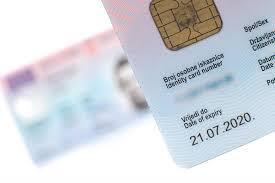After the Parliament adopted the new Identity Card Act, which will enter into force in August next year, HRT's Dnevnik finds out that an application is being prepared that will enable the use of the card on mobile devices with the highest security standards.
Previously issued ID cards will be valid until their expiration date, and the price of production remains the same, writes HRT.
"We will be able, as now, but from mobile devices, via mobile phones or tablets, to literally sign our documents, we will practically be able to sell our property or buy real estate digitally from the comfort of our home," Bernard Grsic told HRT Dnevnik. Secretary of State of the Central State Office for the Development of the Digital Society.
Amendments to the Identity Card Act were adopted to implement the Regulation of the European Parliament and of the Council on strengthening the security of identity cards of Union citizens and residence documents issued to Union citizens and their families exercising the right to free movement, which entered into force on 1 August 2019, and is directly applicable in all Member States from 2 August 2021.
As the Ministry of the Interior explained to Dnevnik HRT, the novelty brought by the amendment to the Identity Card Act is that the identity cards on the new chip will contain biometric identifiers of the identity card holder, ie a display of the identity card holder's face and two fingerprints ( papillary lines of the index finger of the left and right hand) in interoperable digital formats.
The appearance of the identity card is partly changed in accordance with the provisions of the Regulation, so the identity card on the front will contain a two-letter mark of the Republic of Croatia printed in negative in a blue rectangle surrounded by 12 yellow stars.
Age limit raised
The period until which identity cards issued to persons up to the age of 70 are valid will be five years.
Amendments to the Act changed the age limit for issuing identity cards that were issued without a validity period in such a way that the age limit was raised from 65 to 70 years of age, so that persons over 70 years of age will be issued an identity card with a validity period of 40 year. In reality, this means that an identity card is issued to this category of citizens with an unlimited validity period, but this is expressed in years so that the validity period of these identity cards can be more easily read on electronic document readers.
Most of the previously issued identity cards will remain in use until the expiry date, and some will need to be replaced within a certain period, as provided for in the above Regulation. Thus, ID cards will:
- issued on the basis of the provisions of the 2015 Identity Card Act with a validity period of five years and identity cards issued on the basis of the provisions of the previous 2002 Identity Card Act with a validity period of ten years are valid until expiry and will not need to be changed.
- issued to persons aged 65 or over without a period of validity pursuant to the provisions of the existing Identity Card Act (2015) shall cease to be valid on 3 August 2031 and persons will have to replace them with those issued pursuant to the provisions of this Act. Exceptionally, this does not apply to persons who will be 70 years of age or older on 2 August 2021 and who will continue to use their identity cards issued without an expiration date after 3 August 2031.
- issued without a period of validity on the basis of the provisions of the Identity Card Act 2002, citizens will continue to use after August 3, 2031 and are not obliged to replace them with identity cards issued on the basis of the provisions of this Act (such persons will be 70 years and older) 2. 8. 2021.).
- issued without a period of validity under the provisions of the 1991 Identity Card Act expires on 3 August 2026 and persons will have to replace them with identity cards issued under the provisions of this Act (because they do not contain minimum security standards).
Login to the e-Citizens system
In addition to the provisions ensuring the implementation of the above Regulation, the amendments to the Identity Card Act also contain provisions that will enable the creation of preconditions for the use of ID cards on mobile devices such as mobile phones and tablets, and not only on computers as before. Digital certificates stored on the ID card chip can now only be used via a smart card reader connected to a computer from which a particular electronic service is accessed, such as services in the e-Citizens system.
After activating the electronic part of the ID card, the citizen will be able to download the appropriate software solution for mobile devices free of charge, ie the ID mobile application in which they will log in to the previously created access on the Electronic ID Card Portal.
The appropriate software solution for mobile devices, ie application ID, will then be ready for use and will enable easy login to the e-Citizens system with the highest level of security, as well as valid electronic signing via mobile phones or via those devices. Students who do not have the ability to read electronic ID cards (eg tablets). This new service or software solution for mobile devices will not be charged extra.
The provisions of the existing Identity Card Act were also amended, which prescribed the obligation for both parents to participate in the procedure of issuing an identity card to a child. Namely, in the implementation of the Identity Card Act, a number of problems arose in obtaining identity cards for children when one of the parents could not participate in the procedure due to objective reasons or had the difficulty of giving consent to the other parent to conduct the procedure.
Amendments to the Act will enable either parent, as the child's legal representative, to submit a request and take over their child's identity card. An application for the issuance of an identity card for a child may not be submitted by a parent who has been deprived of parental care or has been deprived of the right to exercise parental care or has been deprived of legal capacity in the part relating to obtaining an identity card. According to the amendments to the Act, an identity card will also have to be obtained by a person who has reached the age of 16 and who has been allowed by a court in a non-contentious procedure to marry in accordance with the Family Law if he resides in the Republic of Croatia.
The law comes into force on August 2, 2021.
Source: Poslovni.hr







